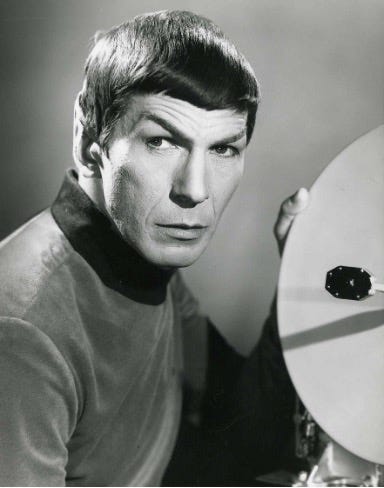In Praise of Human Emotions
Star Trek: The Original Series
1966-1969
Starring: William Shatner, Leonard Nimoy, DeForest Kelley
In spite of his wisdom, it seems that Spock never understood the biological purpose of emotions. Mr. Spock (Nimoy)—the Science- and First Officer, second only in command to Captain James T. Kirk (Shatner) on the Starship Enterprise in “Star Trek” (1966-1969; often referred to as The Original Series, TOS)—is an admirable character, in spite of this particular flaw. A half-Vulcan creature, he often found emotions to be “illogical” and sought to suppress those he inherited from his human mother.
Although humans are (hopefully) guided by logic, emotions are a primal, instinctive, physiological response to stimuli.1 Charles Darwin was an early researcher who studied emotions scientifically. He believed them to be adaptations that allow both humans and animals to survive and reproduce. He also suggested that they play an important role in their safety and survival.2 Note that babies are born crying. This is a neurologic response to the change and discomfort they experience at birth and beyond—they are no longer in that perfect environment of the womb. They cry when they are hungry, cold, hot, thirsty, scared, and even bored. They become sad or angry and demonstrate it by crying, so they may receive care. Apparently evolution caused this. If babies were unable to communicate their distress through emotions, they would die. Past infancy, humans continue to have and express emotions. As we develop speech, we become more efficient in expressing our pain, happiness, pleasure, grief, and sexual urges more accurately. Revealing our emotions to others allows us to thrive in our social groups.
Spock’s displeasure toward human emotion is a frequent theme on “Star Trek.” And due to his reliance on “pure logic,” he often asserts a certain superiority toward his shipmates. Dr. Leonard McCoy (Kelley) plays and interesting foil to him, often manifesting his frustrations toward a cool, restrained Spock. McCoy regularly expresses his emotions; he is an impassioned, argumentative, cantankerous, but compassionate doctor. Spock and McCoy “butt heads” in several of the show’s installments, creating interesting narratives filled with tension and conflict. In at least one episode, Kirk and McCoy demonstrate the importance of emotions to Spock—who apparently fails to understand the lesson. I wish I could recall which episode this is and hope one of my readers will guide me in finding it.
The logic-vs-emotion conflict on “Star Trek” reflects some of the social and political upheavals of the 1960s. “Spock's mixed heritage. . . allowed the show to explore issues of identity and belonging. This exploration was particularly impactful when many viewers were grappling with similar issues related to race and culture. Also, Spock’s logical approach to problem-solving and his use of advanced technology inspired many viewers to pursue careers in science, technology, engineering, and mathematics (STEM) fields. This impact is a testament to the power of science fiction to inspire real-world change.”3
As Spock’s character was written in the 1960s, it could not be informed by scientific research on cognitive neuroscience occurring after the show aired. Apparently “the past 30 or so years of research. . . have uncovered a very tight connection between reason and emotion. Far from being hyper-rational, people who do not experience emotional reactions—known as anhedonics—struggle to make rational decisions, to prioritize, and to follow through on tasks.”4
Obviously, human emotion must be tempered by logic, and we see this repeatedly on the show. This, of course, is evident in Captain Kirk’s character, a leader who wisely and rationally weighs all available options and makes the best decisions for his crew and those encountered on other ships and any planet. Kirk embodies the balance between Spock and McCoy on the show. He is a model to emulate.
Live long and prosper.
Copyright © 2024 by Rosi Prieto, Ph.D.
All Rights Reserved
https://www.psychologytoday.com/us/blog/anger-in-the-age-entitlement/201612/the-function-emotions
https://www.verywellmind.com/the-purpose-of-emotions-2795181
https://sciencefictionclassics.com/navigating-logic-and-emotion-in-star-trek-tos/
https://theconversation.com/sorry-mr-spock-science-and-emotion-are-not-only-compatible-theyre-inseparable-94034


